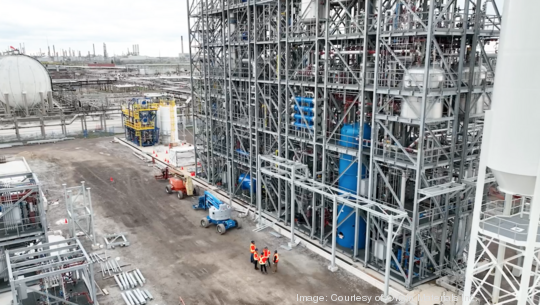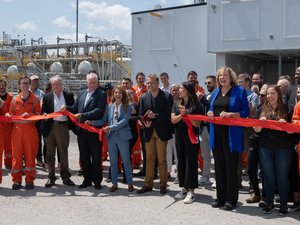
West Sacramento-based Origin Materials Inc. succeeded in converting its plant in Canada to use wood residue as a feedstock to make zero-carbon plastic.
Origin’s (Nasdaq: ORGN) stock closed Wednesday up 22.2% on the news, to end trading at 60 cents a share.
"We have proven the versatility of our technology to accept various feedstocks at lab scale. Now we have proven it at our commercial-scale plant,” said Origin co-CEO John Bissell.
The mill in Sarnia, Ontario, opened early last year and began production in October.
The Canadian plant is the first manufacturing facility in the world making plastic-precursor chemicals at scale that don’t use any petrochemicals and yet are a drop-in replacement for them.
Origin proved that it could make plastic precursor chemicals with cornstarch, which it's been doing since the fall, and now it has processed wood scrap.
The change in feedstocks is a key step, Bissell said. Cornstarch is a processed powder, and is easy to add to the reactor processes in the processing plant.
The wood products “are surprisingly complicated,” he said. “Solids are the trickiest class of materials to process.”
Between moving them, conveying them and then grinding them, they create the steps where breakdowns most easily occur. Once the ground material is in the reactors, then it is just chemical processes.
Origin is now using wood residues byproducts created at a nearby sawmill that manufactures lumber and flooring.
The wood biomass also has the advantage of being cheaper than cornstarch. Cornstarch has advantages as well, he said. The plant can process using the cornstarch much faster if it needs to get a lot of volume produced quickly.
“Our customers are engaged and excited about the ability of our technology to create a variety of sustainable and in many cases performance-advantaged products using a range of feedstocks," Bissell said. “We look forward to continued progress in scaling our biomass conversion technology in support of our mission to enable the world’s transition to sustainable materials.”
Origin’s mission is to make plastic precursor chemicals using scrap wood or other organic products as a replacement for petroleum.
The company makes zero-carbon PET plastic out of renewable plant materials. PET plastic is the product most used in everything from bottles and packaging to textiles and tires.
The Sarnia plant was a $130 million investment. Origin’s following plants will be more than $1.6 billion investments each.
The company has said it will use the Origin 1 factory in Canada to fulfill customer demand around qualification and sampling. The Sarnia plant will also develop higher-value products and applications for many products and materials.
Origin has agreements with global chemical companies including South Korean industrial conglomerate Hyosung Advanced Materials Corp. and Thailand-based Indorama Ventures, the world's largest producer of PET plastic resins.
Origin already has many high-profile consumer brand companies committed to using its products, including Paris-based international luxury brand company LVMH Moët Hennessy Louis Vuitton, New York-based cosmetics powerhouse Revlon Inc. and PepsiCo Inc. (NYSE: PEP).








